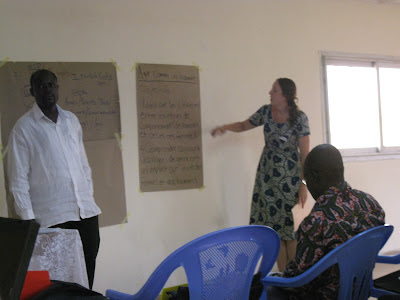May 20, 2012
Togo has been my home for the last eight months. I have been
living in my village, Asrama, and an official Peace Corps volunteer for six
months. I wanted to wait to talk about the experience of the first few months
at post after having gained some emotional distance. They say that the first
three months of your service at your post is when you are most likely to drop
out or Early Termination (ET) from Peace Corps because they are the most
difficult months.
Having survived those first three months and beyond I have
to agree that the first three months at Asrama so far have been the hardest.
Training was a stressful, but extremely structured time period. We were told
where to go and what to do, and everything we needed was provided.
All to soon training came to an end and it was time for
the Swear-in Ceremony. It was an immensely emotional time for all of us. We had to
say good bye to our host families, the stress of giving speeches in local
languages before cameras, buying everything we would need to set up our posts,
the joy of finally officially becoming Peace Corps volunteers, celebrating, and
then saying good bye to go off alone to do what we came here to do.
I remember the ride from Lome to Asrama. Peace Corps had
bought out bush taxies to take us and our belongings to our new home. I was in
the van with two other new volunteers in my region; Rad and Alex. My
village was the first stop. I was filled with fear, excitement, and worry as
the van bounced along my horrible dirt road. The closer I got the higher my
anxiety rose. We unloaded all my stuff onto my porch and the taxi drove away.
That first night was the hardest I’ve had in Togo so far. I
don’t know what I would have done without my dog Swarley that first night. I
felt so alone and overwhelmed. The Togocell tower in village was out that night
so I was unable to call anyone for moral support, which made things so much
worse. My homologue, Akpo, who was the only person in village that I really
knew at the time was in Benin. I laid on my bed wondering what I had gotten
myself into. Doubt clouded my mind. Could I really do this? Live here? Was I
strong enough?
Togocell continued to be out for the next few days. My first
conversation back home was to explain to my Dad not to panic, but that I was on
my way to Lome having been bitten by the Chief of the Gendarm’s dog. I’m so happy for that dog biting me now.
Going to spend three days at the Med Unit in Lome was really wonderful. It
allowed me to have a moment to mentally process everything and talk to my Dad,
who has always been good at getting me to move beyond my fear and encourage me
to do my best.
Things got better after that, but were full of
disappointments and challenges. Getting projects started was painfully slow.
The first three months I concentrated on integration and setting up my home. I
went to marche on Mondays, hung out with the Chief de Asrama, talked to Akpo,
made visits to the school, and drank coke at my buvette. Integration is full
time job when you arrive in village, but it doesn’t feel like you’re
accomplishing anything. It’s frustrating learning to navigate a community whose
first language you know nothing about and second language is only spoken by the
educated.
Then there was the constant sickness, which thank God has
finally seemed to calm down. For a while it seemed every two weeks I was
horribly and violently ill. The med unit kept telling me it was probably food
poisoning, but that sounded like such a mild and an unsatisfying diagnosis for
what I was experiencing. I was worried something really bad was wrong with me
that the tests were just not catching. I expected to be sick joining the Peace
Corps and living in a third world country, but not that sick. However, my
health seems to have leveled out.
When I began teaching at the lycee is when life in village
really improved drastically. People stopped calling me yovo. Now wherever I
walk I hear people shouting my name. Teaching not only gives me something to
do, but it also gives me a sense of accomplishment. Makes being here worth all
the initial heartaches. Plus, I honestly love working with the kids. They are
great and make me laugh. This is why I joined Peace Corps. I wanted to make an
impact.
So what am I trying to get at with this entry? I know there
is a new stage arriving in Togo in July and that there are other future Peace
Corps volunteers waiting eagerly for that departure date searching the internet
for any tidbit of information about their new life. I want to say that yes,
those first three months are going to be filled with heartache, illness,
challenges, and overall adjustment. However, if you stick it out Peace Corps
can be so rewarding.
I can’t imagine leaving Togo for anything. I truly love it
here. I’m looking forward to teaching again in September. I have Camp Unite
this summer. I have plans for future projects like a Homme Comme Partener (Men
as Partners) formation in October, a Mothers Nutrition Day at my CMS, and Take
Our Daughters to work the following spring break. I think that joining Peace Corps has been the
best decision I have every made for myself. Sure, I had moments of doubt and
I’m so grateful I was able to persevere past them.































.JPG)
.JPG)
.JPG)
.JPG)


